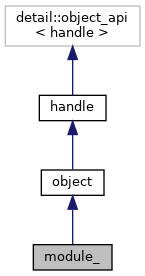Wrapper for Python extension modules. More...
#include <pybind11.h>

Public Types | |
| using | module_def = PyModuleDef |
Public Member Functions | |
| PYBIND11_NOINLINE void | add_object (const char *name, handle obj, bool overwrite=false) |
| template<typename Func , typename... Extra> | |
| module_ & | def (const char *name_, Func &&f, const Extra &...extra) |
| module_ | def_submodule (const char *name, const char *doc=nullptr) |
| module_ (const char *name, const char *doc=nullptr) | |
| Create a new top-level Python module with the given name and docstring. More... | |
| void | reload () |
Reload the module or throws error_already_set. More... | |
 Public Member Functions inherited from object Public Member Functions inherited from object | |
| template<typename T > | |
| T | cast () && |
| template<typename T > | |
| T | cast () const & |
| template<> | |
| void | cast () const & |
| object ()=default | |
| object (const object &o) | |
| Copy constructor; always increases the reference count. More... | |
| object (handle h, borrowed_t) | |
| object (handle h, stolen_t) | |
| object (object &&other) noexcept | |
Move constructor; steals the object from other and preserves its reference count. More... | |
| object & | operator= (const object &other) |
| object & | operator= (object &&other) noexcept |
| PYBIND11_DEPRECATED ("Use reinterpret_borrow<object>() or reinterpret_steal<object>()") object(handle h | |
| handle | release () |
| ~object () | |
Destructor; automatically calls handle::dec_ref() More... | |
 Public Member Functions inherited from handle Public Member Functions inherited from handle | |
| template<typename T > | |
| T | cast () const |
| template<> | |
| void | cast () const |
| bool | check () const |
| const handle & | dec_ref () const & |
| handle ()=default | |
The default constructor creates a handle with a nullptr-valued pointer. More... | |
| template<typename T , detail::enable_if_t< detail::all_of< detail::none_of< std::is_base_of< handle, T >, detail::is_pyobj_ptr_or_nullptr_t< T >>, std::is_convertible< T, PyObject * >>::value, int > = 0> | |
| handle (T &obj) | |
Enable implicit conversion through T::operator PyObject *(). More... | |
| template<typename T , detail::enable_if_t< detail::is_pyobj_ptr_or_nullptr_t< T >::value, int > = 0> | |
| handle (T ptr) | |
| const handle & | inc_ref () const & |
| operator bool () const | |
Return true when the handle wraps a valid Python object. More... | |
| bool | operator!= (const handle &h) const |
| bool | operator== (const handle &h) const |
| PyObject *& | ptr () |
| PyObject * | ptr () const |
Return the underlying PyObject * pointer. More... | |
Static Public Member Functions | |
| static module_ | create_extension_module (const char *name, const char *doc, module_def *def, mod_gil_not_used gil_not_used=mod_gil_not_used(false)) |
| static module_ | import (const char *name) |
Import and return a module or throws error_already_set. More... | |
 Static Public Member Functions inherited from handle Static Public Member Functions inherited from handle | |
| static std::size_t | inc_ref_counter () |
Additional Inherited Members | |
 Public Attributes inherited from object Public Attributes inherited from object | |
| bool | is_borrowed: handle(h) { if (is_borrowed) { inc_ref() |
 Protected Attributes inherited from handle Protected Attributes inherited from handle | |
| PyObject * | m_ptr = nullptr |
Detailed Description
Wrapper for Python extension modules.
Definition at line 1220 of file pybind11.h.
Member Typedef Documentation
◆ module_def
| using module_::module_def = PyModuleDef |
Definition at line 1312 of file pybind11.h.
Constructor & Destructor Documentation
◆ module_()
|
inlineexplicit |
Create a new top-level Python module with the given name and docstring.
Definition at line 1226 of file pybind11.h.
Member Function Documentation
◆ add_object()
|
inline |
\rst Adds an object to the module using the given name. Throws if an object with the given name already exists.
overwrite should almost always be false: attempting to overwrite objects that pybind11 has established will, in most cases, break things. \endrst
Definition at line 1302 of file pybind11.h.
◆ create_extension_module()
|
inlinestatic |
\rst Create a new top-level module that can be used as the main module of a C extension.
def should point to a statically allocated module_def. \endrst
Definition at line 1319 of file pybind11.h.
◆ def()
|
inline |
\rst Create Python binding for a new function within the module scope. Func can be a plain C++ function, a function pointer, or a lambda function. For details on the Extra&& ... extra argument, see section :ref:extras. \endrst
Definition at line 1236 of file pybind11.h.
◆ def_submodule()
|
inline |
\rst Create and return a new Python submodule with the given name and docstring. This also works recursively, i.e.
.. code-block:: cpp
py::module_ m("example", "pybind11 example plugin");
py::module_ m2 = m.def_submodule("sub", "A submodule of 'example'");
py::module_ m3 = m2.def_submodule("subsub", "A submodule of 'example.sub'");
\endrst
Definition at line 1259 of file pybind11.h.
◆ import()
|
inlinestatic |
Import and return a module or throws error_already_set.
Definition at line 1278 of file pybind11.h.
◆ reload()
|
inline |
Reload the module or throws error_already_set.
Definition at line 1287 of file pybind11.h.
The documentation for this class was generated from the following file: